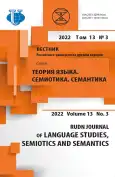The Russian Language Personality in the Current Diachrony: a New Associative-Verbal Database (2014-2021)
- 作者: Shaposhnikova I.V.1
-
隶属关系:
- Institute of Philology of the Siberian Branch of the Russian Academy of Sciences
- 期: 卷 13, 编号 3 (2022)
- 页面: 648-665
- 栏目: COGNITIVE RESEARCH
- URL: https://journal-vniispk.ru/2313-2299/article/view/323480
- DOI: https://doi.org/10.22363/2313-2299-2022-13-3-648-665
- ID: 323480
如何引用文章
全文:
详细
The study presents a new Russian regional associative database (Siberia and the Far East) - SIBAS 2, obtained in a mass associative experiment (2014-2021) in the Asian regions of the Russian Federation. The author describes the main parameters of the scientifically significant information provided by the electronic resource SIBAS, the characteristics of the data in SIBAS 2 in comparison with the database SIBAS 1 reflecting the dimensions of the Russian language personality in the Asian regions of Russia, recorded in the period from 2008 to 2013. The associative dominants identified with the help of the SIBAS 1 resource are compared with the corresponding dimensions of the RLP, explicated by psycholinguists in the European part of the Russian Federation on the basis of the EURAS reverse dictionary (2008-2013); the dominants of SIBAS 1 and SIBAS 2 are compared with the all-Russian data of the reverse dictionaries of RAS (Russian Associative Thesaurus): the first (1988-1991) and second (1992-1995) stages of the all-Russian experiment. Against this background, the author presents new results of a general analysis of the semantic nodes of the SIBAS associative-verbal network, statistical ordering of the entire array of verbal associates in the current diachrony (2008-2021). Such statistical organization of the associativeverbal material can be viewed as a methodological technique, a preliminary step in the study of the psychologically relevant fluctuations of the system-forming semantic accentuations of the Russian language personality, their historical and cultural roots and meaningful transformations referring to a particular period of time (here mostly according to the data of SIBAS 1 and SIBAS 2).
作者简介
Irina Shaposhnikova
Institute of Philology of the Siberian Branch of the Russian Academy of Sciences
编辑信件的主要联系方式.
Email: i.shaposhnickowa@yandex.ru
ORCID iD: 0000-0003-3519-1209
Dr. Sc. (Philology), Professor, Chief Researcher, Institute of Philology
8, Nikolayev str., Novosibirsk, Russian Federation, 630090参考
- Russian Psycholinguistics: Results and Prospects (1966–2021): a research monograph (2021). I.A. Sternin, N.V. Ufimtseva, E.Yu. Myagkova (eds.). Moscow: Institute of Linguistics RAS— MMA. (In Russ.) https://doi.org/10.30982/978-5-6045633-7-3
- SIBAS 1 and SIBAS 2 — Russian Regional Associative Database: Siberia and Far East (2008–2022), I.V. Shaposhnikova &A.A. Romanenko (eds.). URL: http://adictru.nsu.ru (accessed: 28.03.2022). (In Russ.).
- SIBAS 1 — Shaposhnikova, I.V. & Romanenko, A.A. (2014). Russian Regional Associative Dictionary (Siberia and Far East). Vol. I. From stimulus to reaction. Moscow: Moscow Institute of Linguistics. (In Russ.).
- Shaposhnikova, I.V. (2020). Image of the Human World and Semantic Organization of Lexicon in Interdisciplinary Linguistics. Science Journal of Volgograd State University. Linguistics, 19(5), 155–172. https://doi.org/10.15688/jvolsu2.2020.5.14 (In Russ.).
- Shaposhnikova, I.V. (2021). Integrating Role of the Conception of Language Personality in the Development of the Theory of Language. RUDN Journal of Language Studies, Semiotics and Semantics, 12(2), 279–301. https://doi.org/10.22363/2313-2299-2021-12-2-279-301 (In Russ.).
- RAS (Russian Associative Dictionary) (2002). Yu.N. Karaulov, G.A. Cherkasova, N.V. Ufimtseva, Yu.A. Sorokin & E.F. Tarasov (eds.) Vol. I. From stimulus to reaction: about 7 000 stimuli. Vol. II. From reaction to stimulus: over 100 000 reactions. Moscow: Astrel Publishing house: Publishing house AST. URL: http://www.tesaurus.ru/dict/dict.php (accessed: 28.03.2022). (In Russ.).
- EURAS — Ufimtseva, N.V. & Cherkasova, G.A. (2018). Russian Regional Associative Dictionary (European Part of Russia). Vol. I. From stimulus to reaction. Moscow: Moscow International Academy. (In Russ.).
- EURAS — Ufimtseva, N.V. & Cherkasova, G.A. (2018). Russian Regional Associative Dictionary (European Part of Russia). Vol. II. From reaction to stimulus. Moscow: Moscow International Academy. (In Russ.).
- SIBAS 1 — Shaposhnikova, I.V. & Romanenko, A.A. (2015). Russian Regional Associative Dictionary (Siberia and Far East). Vol. II. From reaction to stimulus. Moscow: Moscow Institute of Linguistics. (In Russ.).
- Karaulov, Yu.N. (2002). Russian Associative Dictionary as a New Linguistic Resource and Toolkit for Analysis of Language Faculty. In: Russian Associative Dictionary, Yu.N. Karaulov, G.A. Cherkasova, N.V. Ufimtseva, Yu.A. Sorokin, E.F. Tarasov (eds.) Vol. I. From stimulus to reaction: about 7 000 stimuli. Moscow: Astrel, AST. pp. 750–782. (In Russ.).
- Shaposhnikova, I.V. (2021). The Mode of Intentionality of the Russian Language Personality through the Prism of Associative Grammar. Vestnik NSU. Series: Linguistics and Intercultural Communication, 19 (4), 135–150. https://doi.org/10.25205/1818-7935-2021-19-4-135-150 (In Russ.).
- Zalevskaya, A.A. (2005). Psycholinguistic Research. The Word. Text: Selected Works. Moscow: Gnozis. (In Russ.).
- Ufimtseva, N.V. (2011). Language Consciousness: Dynamics and Variability. Moscow; Kaluga: Institute of Linguistics RAS (IP Shilin I.V.). (In Russ.).
- Ufimtseva, N.V. (2017). Ethnopsycholinguistics as a Branch of the Theory of Speech Activity. In: (Neo)psycholinguistics and (Psycho)linguoculturology: New Sciences about Homo Loquens. Research monograph, I.A. Bubnova, I.V. Zykova, V.V. Krasnyh, N.V. Ufimtseva (eds.). Moscow: Gnozis. pp. 21–96. (In Russ.).
- Lur’e, S.V. (2010). General Cultural Script and Functioning of Sociocultural systems. Journal of Sociology and Social Anthropology, XIII (2), 152–167. (In Russ.).
- Tomasello, M. (2011). Origins of Human Communication, M.V. Falikman, E.V. Pechenkova, M.V. Sinitsyna, Anna A. Kibrik, A.I. Karpuhina (transl.). Moscow: LRC. (In Russ.).
- Tomasello, M. (2014). Horizon. The ultra-social animal. European Journal of Social Psychology, 44, 187–194.
- Sapogova, E.E. (2019). The Structure of Personal Thesaurus: Existential Psychological Approach. Siberian journal of psychology, 73, 40–59. https://doi.org/10.17223/17267080/73/3 (In Russ.).
- Karaulov, Yu.N. (1993). Associative Grammar of the Russian Language. Moscow. Moscow: LKI.
- Lyashevskaya, O.N. & Sharov, S.A. (2009). Word Frequencies in the Modern Russian Language (Based on the Russian National Corpus). Moscow: Azbukovnik Publ. URL: http:// dict.ruslang.ru/freq.php (accessed: 20 March 2022).
补充文件









